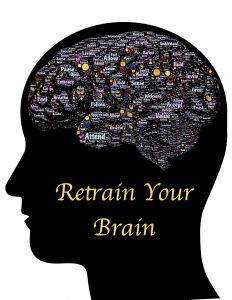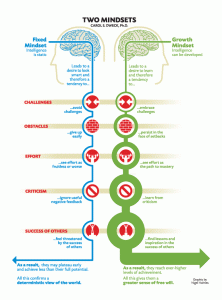The Innovative Instructor covered the topic of Growth Mindset a few years back: Mindsets and Academic Motivation, Michael J. Reese, October 24, 2013, but a recent posting from the Stanford University blog Tomorrow’s Professor seemed worth highlighting.
 Mindsets and Resistance to Learning excerpts a chapter, “How Promoting Student Metacognition can Reduce Resistance” by Rob Blair, Anton O. Tobman, Janine Kremling, and Trevor Morris, from the book, Why Students Resist Learning – A Practical Model for Understanding and Helping Students, edited by Anton O. Tolman and Janine Kremling (Stylus Publishing, 2017). The post provides an excellent overview of Carol Dweck’s theories on fixed and growth mindsets, the self-theories that students develop to describe how they see themselves. “A mindset is a collection of ideas and beliefs about how the world works and how we, as individuals, work within it. Given these structuring beliefs, students’ perceptions about learning opportunities can vary significantly, and these beliefs can have a dramatic influence on how a student views risk taking, learning itself, or the definition of success – or failure.”
Mindsets and Resistance to Learning excerpts a chapter, “How Promoting Student Metacognition can Reduce Resistance” by Rob Blair, Anton O. Tobman, Janine Kremling, and Trevor Morris, from the book, Why Students Resist Learning – A Practical Model for Understanding and Helping Students, edited by Anton O. Tolman and Janine Kremling (Stylus Publishing, 2017). The post provides an excellent overview of Carol Dweck’s theories on fixed and growth mindsets, the self-theories that students develop to describe how they see themselves. “A mindset is a collection of ideas and beliefs about how the world works and how we, as individuals, work within it. Given these structuring beliefs, students’ perceptions about learning opportunities can vary significantly, and these beliefs can have a dramatic influence on how a student views risk taking, learning itself, or the definition of success – or failure.”
The article describes how mindsets contribute to students’ resistance to learning: students with fixed mindsets will resist challenges to do things that they find difficult out of fear of failure; students with growth mindsets believe that “…failure on a task is not failure as a person; it is a chance to learn something new.”
The authors discuss how teacher behaviors can affect student mindsets. In a study (Mueller and Dweck, 1998) students who were given effort-oriented praise (“You must have worked hard.”) were more willing to take on challenging tasks than those who received trait-oriented praise (You must be really smart at this.”). Other studies and their effects are cited. “These studies have implications not only for student learning but also for instructors as it relates closely to resistance to learning. To better understand why some students happily embrace new challenges and others resist those challenges, one must understand where the mindset comes from. This understanding will aid in overcoming resistance and helping students develop their potential.”
In fact, we are not born with a mindset, nor is it an “immutable trait of an individual’s personality (Dweck, 2006).” A person can have a fixed mindset in some areas but a growth mindset about others. Cultural beliefs and social biases, such as “girls/women aren’t good at math” continue to challenge females’ interest in pursuing STEM disciplines. Harsh criticism, or simply lack of support, can be a deterrent to developing a growth mindset. “Research has shown that it is the meaning of the criticism that influences mindset: When criticism is about the person, it instills a fixed mindset: when criticism is about the product or outcome, it has a roughly neutral impact on mindset; when criticism is about the strategies used to reach the product and includes suggestions on those strategies, the growth mindset is instilled (Kamins & Dweck, 1999; Mueller & Dweck, 1998).” Moreover, a fixed mindset can be changed by helping students understand the “malleability of intelligence” and the benefits of a growth mindset.
The article suggests using teaching strategies that foster a growth mindset will help all students to uncover their potential. The authors note in conclusion: “Although it doesn’t simplify the question of how to structure a class, it’s useful to think of students learning course content and key skills in the same way they might learn a complicated dance routine. Some will simply need more time and help than others, but all of them can make significant improvement.”
Macie Hall, Senior Instructional Designer
Center for Educational Resources
Image Source: Pixabay.com

